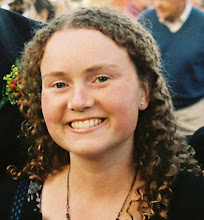When I was very young, Amy Grant's music constantly played in my parents' house. (I can still picture her leopard print jacket on that record sleeve.) And now, after many, many years of relatively Amy-Grantless life, the words of this song still go through my head: "I have decided / I'm gonna live like a believer / turn my back on the deceiver / gonna live what I believe." Not a bad idea, really. I'm all for "practicing what we preach," "walking the walk," and all those other cliches.
Because we believe we're saved by grace, we should stop acting like we're not. Because we believe Jesus loves everyone, we should love everyone, too. Or, m0re frequently harped on, because we believe we're not supposed to do certain things, we shouldn't do them.
I'm afraid that by arguing against this idea, it's going to sound like I'm advocating either hypocrisy or license. That's not what I'm saying at all.
Here's the thing. I think that how we live is inextricably tied up with what we believe. Ultimately, I think, we all live what we really believe. That's why what we believe is so incredibly important.
If we really, truly believe that each individual is precious to God, then we'll treat them as if they have incredible value. If we really, truly believe that God loves us, then we'll be more free to love others. When we fail to love others, or when we fail to live like we are loved, I think it really comes down to the fact that we don't really believe everything we claim to believe.
I think that we can tell a great deal about what people actually believe by observing the way they treat those around them. For that matter, we can learn an awful lot about what we believe by paying attention to what we're thinking about ourselves and other people.
Now, I'm not saying that we should give up on trying to believe these things or that we should stop acting on these truths until we've finally become fully convinced of them. But I think that acknowledging our lack of belief is an important first step. In order to counter falsehood with truth, you have to confront the falsehood. As one desperate father told Jesus, "I do believe; help me overcome my unbelief!" (Mark 9:24).
Sometimes, I think we have to just live what we're trying to believe-- and I think that living as if we believe helps us to actually believe. To a certain extent, belief is a choice, and living as if we believe is an important part of that choice.
I don't have everything figured out, but, to borrow Amy Grant's words, "I'm gonna live like a believer." And I believe, by God's grace, one day I'll finally fully be one.
Thomas and the motorcycle
10 years ago
